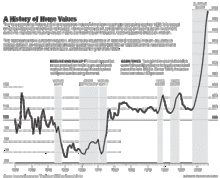I confess to being puzzled by the Federal Reserve's actions in recent weeks, as well as by the assumptions of even most of the Fed's public critics that we are not likely to go into a recession. Without an economics degree, I may well be misunderstanding the evidence or the Fed's duties. I had begun writing a series of long posts on the Fed two weeks ago, but decided to wait to publish them to see if the Federal Reserve would lower interest rates before I waded into such a difficult policy thicket.
I had always thought that part of what turned financial hardships into recessions and recessions into depressions was severe restrictions in the willingness of financial institutions to lend and borrow money. For example, after the 1929 stock market crash, banks and brokerage houses reformed their excessively easy lending practices, leading to a massive contraction in the supply of money and its velocity.
Over the last year, we have had four straight quarters of lower prices on the sale of existing single-family homes. While price declines so far have been modest, the rising inventory, tighter lending standards, increasing foreclosures, and substantial non-price seller concessions suggest that nominal prices may not fully reflect the extent of the price decline and that things could get much worse in the housing market before they get better.
Since World War II, there have been three sharp housing price declines (in real dollars):
the 1947-48 housing price drop, preceding the Nov. 1948 -- Oct. 1949 recession,
the 1979-82 housing price drop, preceding the July 1981 -- Nov. 1982 recession (and also coincident with the Jan.-July 1980 recession), and
the 1989-91 drop, associated with the July 1990 - March 1991 recession.
With the ridiculously easy lending standards of the housing boom in the 2000s, an impending housing crisis was almost unavoidable, as Robert Schiller argued in March 2006.
Schiller presents housing price data through 2005 in real, inflation-adjusted dollars:

The Federal Reserve, therefore, was and is faced with an extremely difficult challenge: to prevent a severe housing crunch from having its usual effect: driving the US economy into a recession, as the three biggest housing crunches since World War II have done.
For more on Federal Reserve policy, go to The Fed: Part II: What's Goin' On?
Related Posts (on one page):